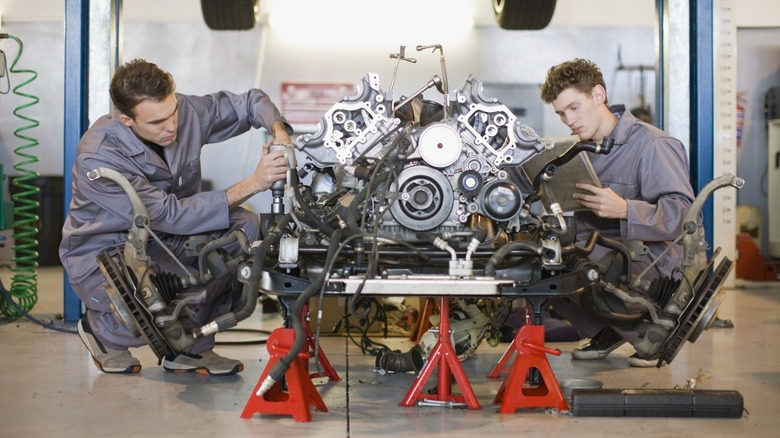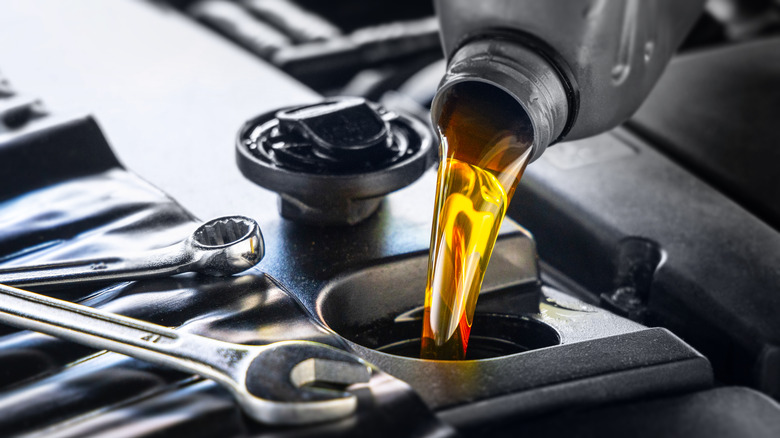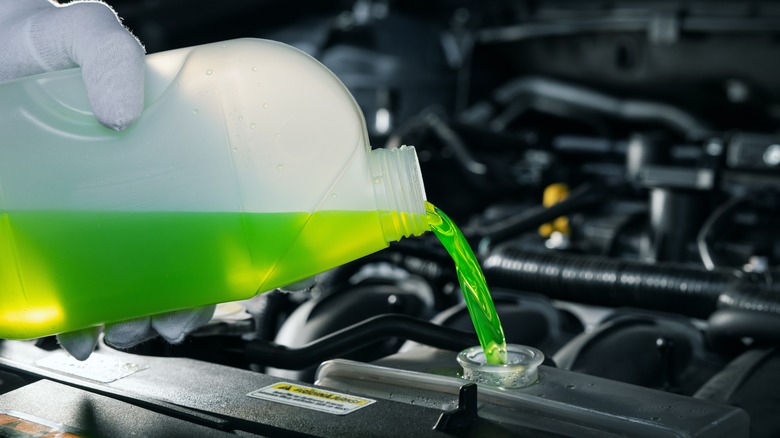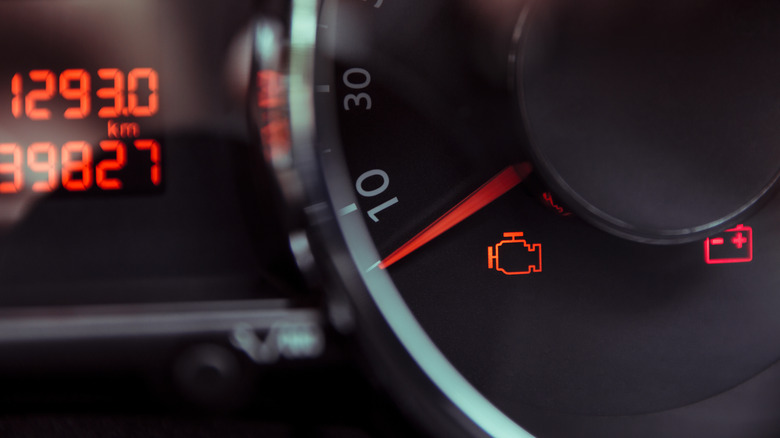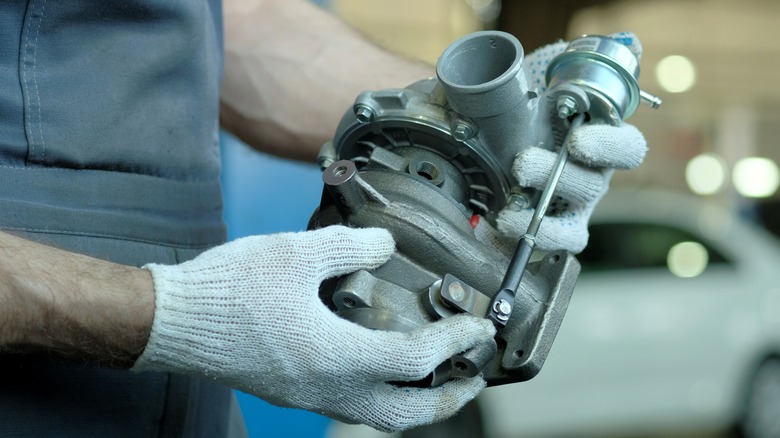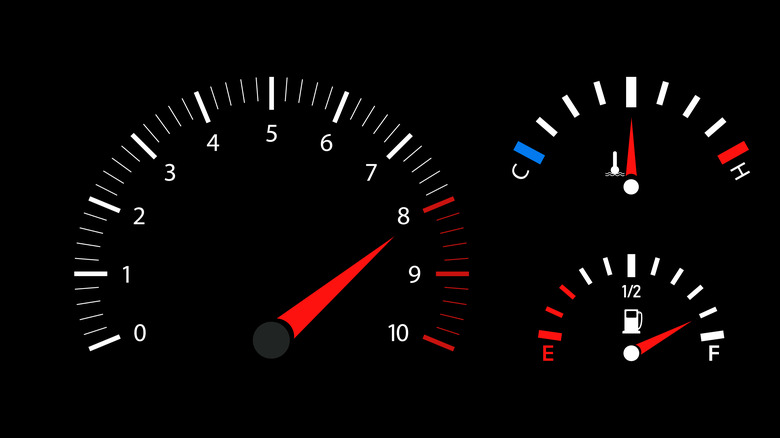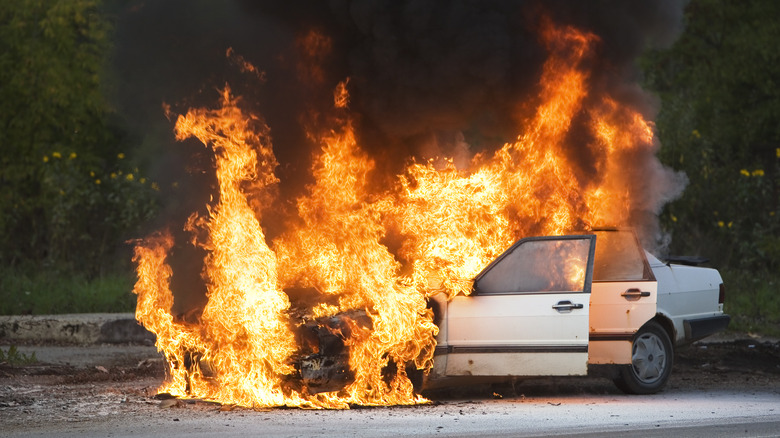10 Bad Habits That Are Ruining Your Car's Engine
Cars are, in general, a lot more reliable than they used to be. Newer manufacturing processes, better materials, and the advancement of onboard diagnostic technologies have certainly helped. Car engines are staying alive longer on average, and diagnosing issues is easier than it used to be. All mechanics have to do these days is plug a machine into the ODBII port on your car and it will tell the mechanic what's going on. It's easier than ever to keep a car on the road longer.
However, none of those improvements matter if the vehicle's owner isn't being careful. Although it is entirely possible to knock around a car quite a bit without causing damage, bad habits can build up over time and reduce the overall lifespan of the car. You wouldn't see damage immediately; you'd only realize it at the end of the car's life when the engine goes down at 100,000 miles instead of 200,000 miles. It might not be that dramatic, but you get the point.
So, here is a list of bad habits that you should avoid assiduously if you want your engine to live longer. Some of these are not always avoidable, and that's okay. Performing some of the actions below once or twice isn't going to harm anything. It's only if you do it over and over again over a long period of time that it starts to harm your vehicle.
Not changing your oil on time (or ever)
Nothing in life is maintenance-free, and that's personified no better than oil changes for your car. Oil is the lifeblood of your engine and is responsible for lubrication and heat dissipation. It's used directly in the movement of essentially any moving part within the engine. Each engine is slightly different and may require a different type of oil. Thus, it's not only important to change and monitor your oil but ensure that you're using the correct oil for your car.
The negative effects of not changing your oil are well documented but we'll go over them briefly here. Oil breaks down over time whether you drive the car or not. When oil breaks down, it loses its ability to lubricate effectively. Additionally, oil can become contaminated with water, fuel, and dirt over time, which also reduces its effectiveness. Finally, all vehicles burn oil, even if it's in small quantities, which means the oil levels will naturally go down as you drive.
So, knowing all of that, it's obvious why changing your oil will prevent premature engine wear. Old oil with contaminants doesn't lubricate as well as fresh, clean oil, and that additional friction in your engine can wear down various engine components, leading to an eventual failure of some sort. Fortunately, this is easily solved with an oil change. You can do it yourself, take it to a shop, or even take it to a dealership to have it done. Most modern vehicles have evolved enough to where you can go further than 5,000 miles between oil changes, but we recommend checking out your owner's manual for the exact numbers.
Avoiding regular maintenance with your other fluids
Oil is the big fluid that needs to be changed. However, it is not the only engine fluid that can cause issues if not changed or at least checked for proper levels. A good example is your radiator fluid. If your radiator springs a leak and your fluid empties out, your car will lose its ability to cool itself down, resulting in engine overheating. Such an event can easily lead to engine damage down the road. There are a number of fluids in the car, including coolant, transmission fluid, brake fluid, and more. They don't all directly correlate to engine damage, but they can all contribute to vehicle failure.
It's even a good idea to keep your fuel topped off. A lot of folks may not know this, but driving a car on its last gallon of gas too often is actually bad for your engine. It can cause damage to the fuel pump, because fuel pumps often require a certain amount of gas to function properly. Continuous low fuel can make engines misfire and even cause issues with the catalytic converter in rare instances. Make sure to top off your fuel a bit sooner to avoid all that drama.
The number of ways the other fluids in your car interact with your engine do matter, even if it's not as big a deal as it is with oil. The generally accepted notion is that you should flush your coolant and brake fluid every couple of years or 30,000 miles. Of course, you should check your owner's manual for the exact numbers for your model.
Ignoring the check engine light
This one is fairly self-explanatory. The check engine light comes on when the car detects an issue with something in the engine bay. Unfortunately, it could be any one of dozens of different potential issues and not all of them can cause engine problems. For example, some models will turn on the check engine light if you leave your fuel cap off. That's a pretty easy problem to fix. However, not all the issues are that simple, so it may be worth taking the car into a mechanic to find out what's up with the light.
A few potential causes of a check engine light include spark plug issues, a damaged oxygen sensor, a dirty mass air flow sensor, a catalytic converter issue, or something being physically wrong with the main engine components. Depending on the issue, you can drive around for days, weeks, or even months without additional issues. However, each mile you drive could be putting wear on your engine that can eventually cause it to fail. If the wear is caused by an engine component issue, that part (or parts) will continue to wear and degrade until you get the problem resolved.
There are two ways you can deal with this. The first is buying an ODBII device and checking the error code yourself. There are usually instructions on how to do so with the ODBII device, and you can find information on how to check your car online. Some auto parts stores, like AutoZone, have services that will check the codes for you for free. Or you can just take it into a dealership or mechanic and have them check it out. It's your call.
Hard acceleration and aggressive driving
Having a fun car is an exercise in restraint. Sometimes, it's fun to just put the pedal to the metal and enjoy a spirited drive around your favorite backroads or highways, provided that you do so within the limits of the law. However, if you drive your car like you stole it too often, it can actually lead to premature engine wear. It's not necessarily difficult to see why with heavy acceleration, heavy braking, and lots of aggressive driving behavior. Cars are designed to live through this without any damage — to an extent. But driving like a maniac all the time will eventually start causing problems.
The other big potential issue is doing all of the above while the engine is cold. Most modern OEMs recommend driving with a light touch for a little while until the car can properly heat up. Going straight from the driveway to driving like a banshee means the engine oil doesn't have the time to reach its operating temperature, which affects its viscosity. That can cause engine wear if you do it too often. In general, you don't have to let the car sit in the driveway for ten minutes first, but it's a good idea to drive it less aggressively until it warms up a bit.
There are other ways of driving that can hurt your engine as well, and we'll get into that later. Until then, it's not a bad thing to drive your car aggressively on occasion. Just don't make it a habit or you'll start wearing out your engine components prematurely.
Overloading the car
Every vehicle has a maximum weight limit and, as you can imagine, it's not a good idea to exceed that weight limit. Even vehicles without tow ratings still have weight limits. For example, a 2019 Honda Accord with the 2.0-liter turbo engine has a payload capacity of 850 pounds. Once you exceed that limit, it can cause damage to all sorts of systems within the vehicle, including the engine, suspension, brakes, and even the transmission. If you go too far overboard, you might even drag the undercarriage of the car along the ground, bottom out the vehicle more often, and damage the outside of the car in other ways.
For the engine, though, the big problem is engine strain. A car's engine is designed to pull a certain amount of weight. It can and will pull more than that, but it causes an immense amount of strain on the components. That strain will eventually lead to component failure and engine wear. Plus, there are myriad negative benefits to overloading your car. Many insurance companies will void your car insurance for doing so. So, if you do it too often or to an extreme degree, you could wind up with a broken-down car and no car insurance. That's a rough double whammy.
While it may not be as convenient, it's a smarter idea to rent something capable of carrying the weight you want to carry. U-Haul trucks and other types of rental trucks will fit the bill just fine, as their engines are designed to haul a whole lot more than your sedan. Let the proper engine do the work.
Making short trips too frequently
This isn't terribly different from the kind of engine wear that you could get from driving your car aggressively, because it stems from more or less the same issue. When you make short trips, your engine never really gets to warm up all the way. Driving your car around cold all the time has the same potential outcome as driving it around like a lunatic while the engine is cold. It can lead to engine wear.
The problem is especially pronounced in newer engines and turbocharged engines where fuel dilution is a common issue. Fuel dilution occurs when fuel gets into the engine oil, which can cause the oil to overflow. That causes problems all on its own. The best way to fix dilution is to drive your car around long enough for it to warm all the way up. Once the engine is at its operating temperature, it'll burn off the fuel in the oil, allowing the oil levels in the car to return to normal. While this likely won't cause any noticeable damage in the short term, it may cause increased engine wear and potential issues over the long term.
The fix is simple enough. Every now and then, get in the car and drive it around for 30-60 minutes to let the engine warm all the way up and burn off the excess fuel in the oil. Since many folks commute to work, and commutes are, on average, about 20 to 25 minutes, many folks can avoid the issue simply by taking their morning and evening jaunts to and from work. If you're not one of those people, just drive the car a little more often to solve it.
Not letting your turbocharger cool down
Turbochargers are commonplace these days. They allow cars to deliver more power while also being more fuel-efficient than most of their six-cylinder counterparts. By attaching a turbocharger to a four-cylinder engine, manufacturers can get similar power numbers to a V6 without the hit to efficiency, fuel economy, or emissions. However, the addition of a turbocharger means a little extra care has to be taken in order to make sure things stay OK inside the engine bay.
In general, typical driving won't affect the turbocharger at all. They're designed to handle everyday driving without complaint. However, turbocharged cars are fun to drive, and some spirited driving gets the turbocharger heated up quite a bit. It's recommended to either drive around normally for a few minutes before parking the car or let the car idle once parked for a few minutes to cool the turbo down if you've just engaged in an afternoon of fun. This can prevent damage to the turbocharger, which of course helps it live longer.
A lot of the other things mentioned previously also apply to the turbocharger. For example, your engine oil also lubricates and cools the turbocharger in your car at least some of the time. Thus, changing your oil consistently also helps your turbocharger stay cooler and better lubricated. That leads to less turbo wear and tear, which helps prevent premature failure. If your turbocharger is messed up, it can also mess up your engine, since it's all part of the same system. In other words, make sure to take proper care of your turbo.
Engine lugging
Engine lugging isn't done as much as it used to be since the proliferation of automatic transmissions. Such transmissions shift automatically, which takes a lot of the control out of the driver's hands, and it's also a great way to prevent engine lugging. However, if you drive a manual transmission, it's a good idea to know what engine lugging is, why you should avoid it, and how it can damage your engine.
In short, engine lugging is when you drive your car in a higher gear than it's supposed to be in. When this happens, the car drives at too low of an RPM, which causes strain to the engine. Somewhat counterintuitively, lugging the engine can cause the engine to overheat, and we all know what happens to things when they overheat. It happens because the engine is having problems moving the car forward at such a low RPM, and the strain causes excess heat. Over time, the excess heat can wear down engine components, cause damage, and even potentially cause engine failure.
The easiest way to prevent engine lugging is to simply shift when needed. If you're in too high of a gear, the car simply won't feel right, and downshifting to the proper gear will get the car moving again the way it should. It may take a bit of practice, especially for younger drivers, to get a good feel for how the car is supposed to run. However, it's an essential skill to have when driving a manual transmission.
Consistently hitting the rev limiter
We've all been in that parking lot where the souped-up car is revving its engine loudly to announce its presence to everyone within earshot. Such behavior is fun on occasion but doing it too much can actually damage the engine. This is especially true if you run the car up to its limiter. Car manufacturers understand that sometimes folks like to rev the car out, so most of them program the car to limit before hitting RPMs that could actually damage the car. Many also implement fuel cut-offs to prevent you from blowing the engine entirely. However, doing it too often can still cause wear and tear on engine components.
The reason why is pretty evident. You're running the car at 6,000 or more RPMs and it's also not going anywhere. Cars aren't designed to be at redline all the time. Typically, they're designed to hit the rev limiter during hard acceleration and that's it. By running the engine that hard consistently, it stresses the engine, which can eventually lead to failure. For the record, it's not a bad thing to occasionally hit the rev limiter. It's there for a reason, and it's to ensure you don't damage the car when you do get up that high. It's just bad to do it all the time.
Another way people can bounce off of the rev limiter is with a manual transmission car. If you downshift while going too fast, your RPMs will shoot up super high, which can also cause damage to the engine. It's entirely possible to blow your entire engine if you downshift to too low of a gear while going too fast. Bouncing the car off of the rev limiter can do that too — it just takes longer.
Ignoring concerning smells, sounds, or visuals
Perhaps the oldest method of telling that something is wrong with your car is the old smell test. While there are myriad sensors in your car to tell you whenever the vehicle does something the sensors do not expect, it's still possible to have problems that the sensors can't detect. For those types of problems, you can usually see, hear, smell, or otherwise experience the problem before it becomes big enough to actually cause damage. Being vigilant while driving can not only save your car, but your life as well.
You're likely familiar with some of these sensations. You'll hear the engine knocking before it fails, smell burning oil before you see the leak, or notice some sort of mechanical inconsistency while driving that almost certainly points to a problem in the engine. You take it to the mechanic, get it fixed, and you go on your merry way. Ignore the symptoms, however, and eventually the engine will let you know there's a problem by failing on you. The worst-case scenario is your car breaking down or catching on fire. However, not every issue is so serious that it manifests in that way.
Regardless, if you smell, see, or hear something that sounds off with your car, it's probably best to have someone check it out before it gets any worse. Doing so can prevent further damage to the engine and its components and allow your car to live longer. You can ignore it, but eventually, whatever is wrong will trip a sensor eventually, and you'll have to get it fixed anyway. If you notice something wrong, get it fixed.
